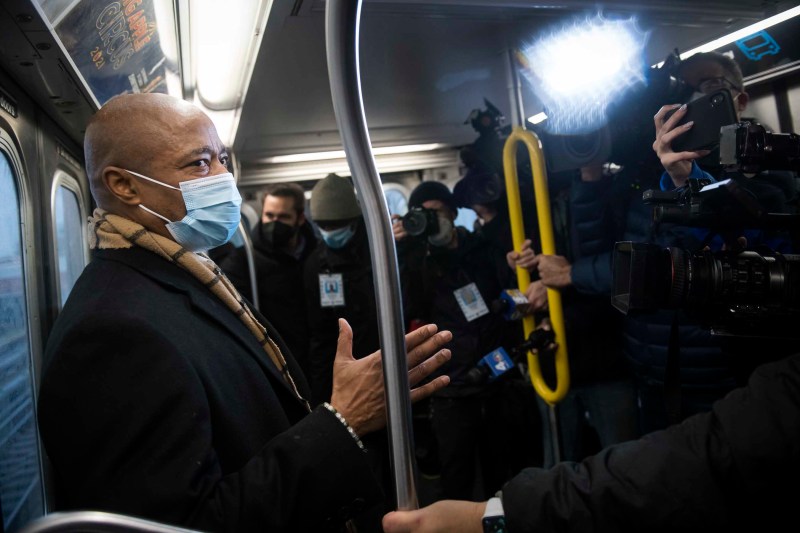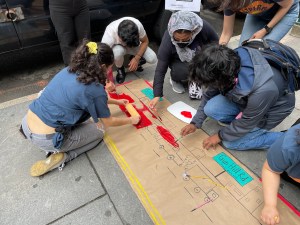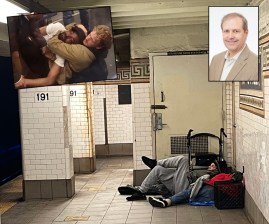Wait, What? Does Mayor Adams Really Think Our Transit System is the Best in the World?

Mayor Adams thinks we have “the best transit system on the globe.”
The new mayor — himself an active transit user — made the boast at a slightly related press conference about street safety and NYPD enforcement of failure-to-yield violations after he was asked whether his road engineering, public education and stepped up enforcement would include the often-forgotten other “E” of Vision Zero: Eliminating the need for car trips in the first place.
Responding to reporter Clayton Guse of the Daily News, the mayor noted the congestion at the intersection of Caton and Coney Island avenues and said:
Well, as a card carrying MetroCard user, I think that the best way to get people out of vehicles is to have an A-1 transportation system that’s safe and reliable. That is crucial. … And we have done an amazing job to get people out of cars. There’s only 1.4 million people with cars … because we have the best transportation system on the globe. We have to continue to invest in it and if we do that, people will rather not sit in traffic, like the traffic we see in here. If we make our streets safer, when people are allowed to feel comfortable using our bike lanes, which we are going to roll out, and we have our transportation system safe, as we continue to talk about, you’re going to see more and more people get out of cars.
Guse asked a follow-up, and got philosophical.
“To be clear, you think that New York City has the best transportation system on the globe? If that’s true, is that sad for the globe?”
Despite the mayor’s well-documented sense of humor, he wasn’t particularly charmed by the reporter’s question:
It’s easy to be cute, but I use the system a lot. And I am really impressed with our system — and my passport is filled with travels across the globe. There aren’t too many systems that are open 24 hours. There aren’t too many systems where you can swipe a MetroCard and go from one end of the city to another end of the city. And so if you don’t feel it’s the best, that’s sad for you because I know how good my system is. … And if you travel with me, we should take a trip together from one end to the next, I’m sure you will see that low-income New Yorkers will tell you without this transportation system, they would not be able to commute in this city. It is the great equalizer. Our transportation system, if you take it away, that cook, that accountant, that police officer won’t be able to move around this city. Nowhere else on the globe are you able to move around the way we are able to move around in New York City and that is not my opinion, that is a fact.
The mayor’s mention of low-income New Yorkers brought to mind the city’s buses, an overwhelming majority of whose riders are low-income residents. Advocates have long called for more car-free roadways specifically to help the very low-income New Yorkers that the mayor evoked. Late last year, in fact, MTA Chairman Janno Lieber even joined Riders Alliance advocates at the release of the group’s book, “Bus Rider Blues,” which is a compendium of horror stories from city bus riders.
Bus speeds under Adams’s predecessor, Mayor de Blasio, were stagnant. As Streetsblog reported last year, overall weekday bus speeds were 8.2 miles per hour citywide in January, 2015, and actually dropped to just 8 miles per hour by November 2021.
So Streetsblog followed up Guse’s question and, pointing to a B16 stuck in traffic on Caton Avenue, asked if the mayor is considering widespread expansion of the small de Blasio initiative to create car-free roadways for buses so that low-income New Yorkers can indeed get to work efficiently. For the record, the mayor did not call our reporter “cute,” but he did say he only wanted to focus on Wednesday’s announcement about enforcement and new intersection design.
But he hinted that he does not, indeed, believe that we have the best bus system in the world:
“Our amazing Commissioner is going to roll out his plan on buses soon,” Adams said.
Of course, it’s hard to answer the question of what city has the “best” transit system (especially given that Adams also defines the transit system as comprising bike lanes, public space and pedestrian options). Other cities have more modern systems. Other cities (Beijing, for example) have more riders. Other cities have lower fares. Other cities (well, Paris) have more stations per 1,000 people than we do.
But there’s no question that New York City’s subway and bus system is the biggest. And it is the most photogenic:
Waterfall down the stairs at 145th Street station, 1 Train, in #Manhattan, #NYC. Flash #flood warnings are in effect until 11:30 pm. pic.twitter.com/pIvwWpQF1t
— NTD News (@NTDNews) September 2, 2021
Advocates were quick to point out that even if he feels our system is the “best,” the mayor needs to act — and quickly.
“I understand what he was saying about our system being the ‘best’ in some ways, like 24-hour service, but it’s still pathetic,” said Dave “Paco” Abraham of StreetsPAC, who attended Wednesday’s presser. “There is so much could be done. We need to push more for everything. Busways, dollar for dollars, are the best bang for the buck and they’re 100 percent under the mayor’s control. They can be built almost overnight.”
And obviously TransitCenter and the Bus Turnaround Coalition doesn’t think we have the best transit system in the world. The groups will gather near City Hall on Thursday at 11 a.m. to highlight “what’s working and what’s not on New York City streets,” the groups said in a statement.
“Riders on routes that have received busways or bus lanes are saving time and getting where they need to go faster than before. But citywide, bus speeds remain stubbornly sluggish,” the statement continued. Transit Center spokesman Ben Fried said the press conference would also make three recommendations for the Adams administration.
Mayor Adams’s talk about New York having the “best” transit system comes in stark contrast to what candidate Adams said on the campaign trail. Indeed, Adams had put out a lengthy policy statement, “Moving Forward Together,” that was very clear more work needed to be done. The policy plan called for:
- more bus lanes and create more busways. “As mayor, we will build 150 miles of new bus lanes and busways in four years — and expedite the rollout of Transit Signal Priority technology.”
- more bike lanes. “The use of our streets must reflect all of those uses safely while encouraging forms of movement that reduce congestion and greenhouse gas emissions.”
- more ways to get around (because the current ones aren’t good enough): “Millions of New Yorkers — mostly people of color in lower-income and middle-income communities — are not within walking distance of the subway and do not have access to decent public transit options. CitiBike says it will close some of those gaps — but it is right now largely in higher-income areas. To connect underserved communities to mass transit and allow them to get around their communities and connect to transit more easily, we will create a citywide network of shared electric bikes and scooters that prioritizes those New Yorkers disconnected from transit.”
- reduce placard abuse.
- make the subway and bus system more ADA accessible.
So, indeed, it’s not currently the best system on the globe.
What city has the “best” transit system? Please tell us in the comments below.



